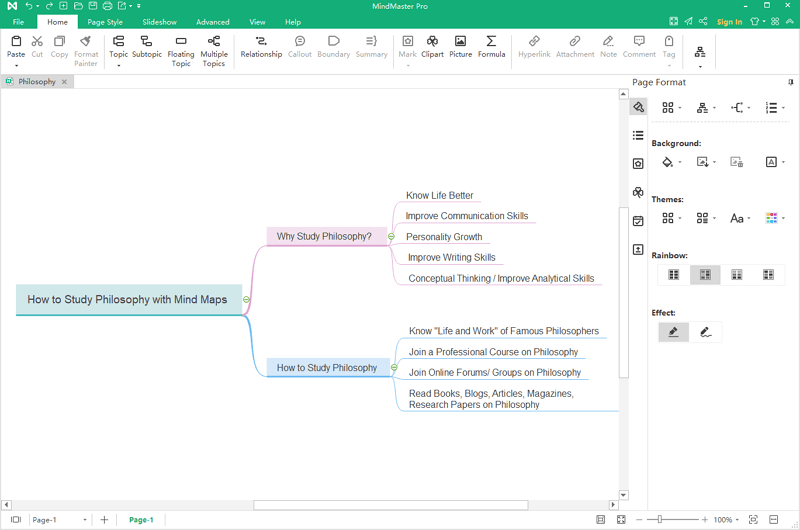How to Study Philosophy with Mind Maps
Create Your Mind Map NowThe study relating to life, truth, mind, insights, nature, relationship together is known as "Philosophy". There are traditional/professional/ regular courses that teach Philosophy. Various undergraduate, postgraduate courses available where you can study philosophy in a professional way.
But if you also have a keen interest in learning philosophy, then you can do that in various ways. And that's the topic of discussion here- How to study philosophy?" If this sounds interesting, then you are reading the correct article.

Why Study Philosophy?
Do things related to life, nature, and interpersonal relationships drive you deep? Do you feel you know the answers to real-life scenarios like "who is a true friend?" Or "What are the duties of a child to his/her parents?" and related things- if "yes" then, of course, you have an inclination towards philosophy. Suppose it is found that someone is inclined towards philosophy, then is it enough reason for that person to study philosophy?
This is what we'll discuss here, reasons to study philosophy, and how to study philosophy. If you want to learn philosophy, then you must be reading this article - we'll discuss some very useful topics that you might require to know as you move forward in the field of philosophy.
1. Know Life Better
Philosophy teaches the responsibilities/ duties of life and how to perform them practically. Through conceptual studies with real-life examples, you will be able to understand the actual meaning of life. What and how to act in different circumstances, how to build and maintain relations, what needs to be considered while performing the daily-based activities- all can be learned through philosophy.
2. Improve Communication Skills
Communication is the way you interact with others. We are unsure of what to do when we get involved in disastrous miscommunications that results in creating chaotic situations. Philosophy makes us understand the true aspects of life, where we measure incidents according to the circumstances and then act upon it with proper analysis. It reduces the chances of miscommunications and improves communication skills. A person with excellent communication skills does wonders.
3. Personality Growth
As you start knowing things deeper than before, it reflects your personality. The way you talk, act, mix with people changes drastically. Through learning the real-life concepts, and understanding the idea behind each work makes you more flexible, understanding, becoming a bright personality whom people will like to follow.
4. Improve Writing Skills
Whatever you write comes out straight from your heart. It's like we speak our hearts out through writing. As you start realizing the actual meaning of life, understanding the core facets of relationships, your self-realization improves. Thus, it automatically enhances your writing skills.
5. Conceptual Thinking / Improve Analytical Skills
Studying philosophy helps in building conceptual thoughts; it develops and improves your analytical skills. In such circumstances where you might not feel sure about choosing the best alternatives in life, your analytical skills will help you to choose the right option. When you undergo a professional philosophy training, through conceptual thinking, you gain analytic skills within yourself.
How to Study Philosophy with Mind Mapping?

1. Know "Life and Work" of Famous Philosophers
You'll find books available in the libraries, or you can connect with online blogs where you can read books on famous people's lives. When you read about them, you'll know a lot of secrets behind their success and how they devote themselves to studying philosophy. This connection between the reader and the author helps develop the mindset of the author.
2. Join a Professional Course on Philosophy
There are various undergraduate, postgraduate, and diploma courses available worldwide, which upon successful completion, you'll be awarded certifications from recognized universities. You'll learn professional training on Philosophy by professional degree holders and learn philosophy through a step-by-step approach. Such training aims to make you an expert in philosophy. If you want to make philosophy a career, then choose the course wisely, which offers job assistance and prepares you according to the industry requirements.
3. Join Online Forums/ Groups on Philosophy
Online resources are of great help when it comes to learning something in detail. It is so helpful because you'll get a chance to connect with many people having the same interest and expertise in the same field. So, you can learn a lot through discussions and knowledge sharing. In case of any doubts, you can always approach them directly and clear your doubts.
4. Read Books, Blogs, Articles, Magazines, Research Papers on Philosophy
Reading makes you acquire subject knowledge; the more you read, the more you gain knowledge about that subject. Philosophy is not something different. Read books, blogs, magazines, and research papers to gather more and more information on the subject. Nowadays, e-books are also available for free, and you can download famous books on philosophy for totally free. So, if you are really keen to learn the subject, don't miss out on the opportunity to read free e-books. But before reading a book, gather some information about it and also check reviews for the same. I can recommend an excellent book on the philosophy "Why Bad Things Can't Happen to Good People!" which is available online for free! This book is written by A A Ravi and a sure help for beginners who want to learn philosophy.
When in doubt whether it is the right time to start learning/studying philosophy, or where to study from - I would recommend you read some famous books on philosophy to understand the subject better. Also, you need to think about it if you are planning philosophy as a career option. To find the best career opportunities on completion of a successful professional philosophy study, you can search “What can I do with a degree in philosophy" in Google and find some good choices. Well, the discussion is a brief one. Keep following the blog to know more about how to study philosophy, the right way!

